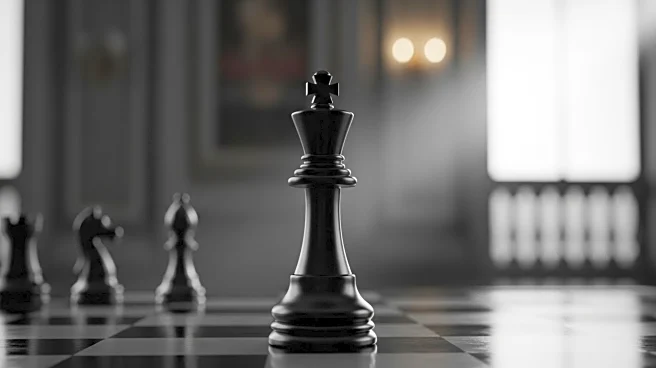What's Happening?
Jude Law stars as Vladimir Putin in the political thriller 'The Wizard of the Kremlin,' directed by Olivier Assayas. The film, premiering at the Venice Film Festival, is a fictionalized account of Putin's rise to power in the 1990s. Law, along with co-stars Paul Dano, Alicia Vikander, and Jeffrey Wright, attended the festival to discuss the film's creation. Law's portrayal does not rely on prosthetics, and he uses his natural voice rather than a Russian accent. The film adapts Giuliano da Empoli's novel, focusing on the character Vadim Baranov, played by Dano, who is based on Vladislav Sourkov, a real-life figure credited with orchestrating Putin's rise. The narrative spans from the 1990s to the 2000s, depicting wars, disasters, and revolutions through Baranov's perspective.
Why It's Important?
The film's exploration of Putin's rise to power is significant in the context of global politics, where autocracy is perceived to be on the rise. By dramatizing the manipulation of media and propaganda, 'The Wizard of the Kremlin' offers insights into the mechanisms of authoritarian power. The film's portrayal of Putin and his inner circle highlights the personal and political transformations that accompany such a rise. This narrative is particularly relevant as it reflects broader concerns about the state of modern politics and the challenges posed by authoritarian leaders worldwide.
What's Next?
The film's release at the Venice Film Festival may spark discussions about the portrayal of political figures in cinema and the impact of such narratives on public perception. As audiences engage with the film, there may be debates about the accuracy and implications of depicting real-life political events and figures. The film could also influence future projects that explore similar themes, potentially leading to more films that examine the rise of authoritarianism and its effects on society.
Beyond the Headlines
The film raises ethical questions about the portrayal of living political figures and the responsibilities of filmmakers in representing historical events. It also prompts reflection on the role of media and propaganda in shaping political narratives and public opinion. The adaptation of a novel into a film underscores the power of storytelling in influencing cultural and political discourse.











